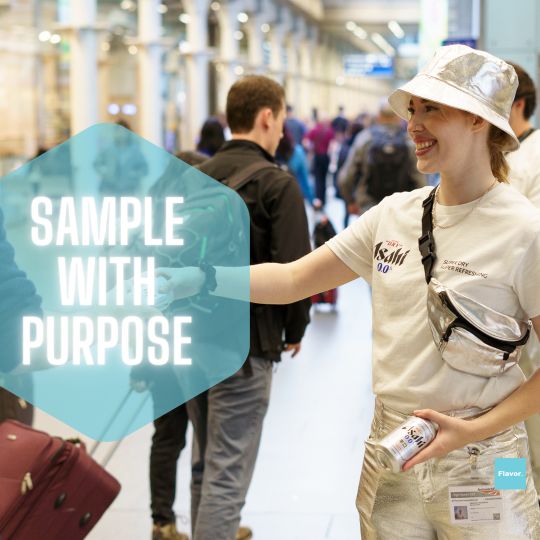Feature: Sustainable Sampling – is the UK following France’s lead?
Posted by

Richard Lloyd-Williams, Managing Director of integrated sampling agency Flavor has just become the first agency of its type to gain BCorp status. In this article he looks at the chellenging area that is sustainable sampling in FMCG and talks to a selection of three brands about the key challenges – and how they meet them.
Sustainability in FMCG
Increasing numbers of consumers in the UK, and worldwide, are demanding brands to be more sustainable and ethical. In particular, Food and Drink brands, having previously been associated with highly unsustainable production, are reviewing how they can become more sustainable.
Brands from General Mills and Asahi through to Rude Health prioritise and hero their sustainable credentials, often having specific roles tasked to ensure that sustainability is at the forefront of business and brand objectives.

This is highlighted by Sam Goodenough, sustainability Manager at Asahi UK, who states that “sustainability is one of the core pillars of our business strategy, with ambitious targets around reducing our footprint across our whole value chain.”
Helene Henderson, Marketing Manager at General Mills also notes that “as a food company we have long been aware that manufacturing our products in a way that is sustainable is the only way to future-proof our brands.”
Hugely important to recognising sustainability are nonprofit network B Lab who are leading system changes to plan for a resilient, sustainable future. As part of this, they award B Corp certification for companies who demonstrate high environmental and social impact.
Rude Health is one of the brands that has achieved BCorp Status. Bertel Haugen, Head of Innovation & Sustainability at Rude Health illustrates how important sustainability is for them by saying “as a BCorp we are committed to treat sustainability and our wider impact as one of our main company KPIs. We consider it in every decision we make.”
Gaining B Corp status has become a coveted means for brands to reassure consumers of their commitment to sustainability.
After Flavor became the first Sampling Agency in the UK and Europe to achieve BCorp Status, I wanted to examine what sustainability means outside of packaging and production methods for brands.
How do brands’ sustainability mandates translate when brands look for service providers and marketing agencies? Liam White, CEO of Dr Wills explains that “it is something we consider and certainly would be a plus point. More visibility on this would be helpful though, as it is hard to know if marketing service providers are sustainable or not.”
Sam Goodenough from Asahi echoes this thought, saying “Sustainable approaches form part of the assessment we carry out on agencies when scoping marketing activity as well as being one of the awards criteria considered in the pitch process.”
However Jamie Prowse, Senior Marketing Manager at Tribeology counters this point noting that Sustainability is “not a consideration when choosing a marketing agency. I’d pick it on merit rather than sustainably credentials of an agency.” offering an insight into how smaller brands have to prioritise their approach even when they have BCorp certification.
Overall FMCG brands’ focus on sustainability points to positive signs for the industry, but I would like to delve into how important Sustainability is in one crucial element of FMCG marketing (and the closest to my heart); Product Sampling…
Product Sampling
Product sampling is a key marketing tool for FMCG brands and often paramount to a brand’s success. Yet sampling and sustainability are not usually synonymous. Traditional Product Sampling is an area of marketing that is inherently associated with unsustainability in fact; cross-country travelling vans, high levels of staffing, specifically created samples, leaflets/coupons, and litter.
The benefits of sampling for a brand are too high to be overlooked though -with an average of 63% of consumers sampled buying the product within 4 weeks. So how do brands in the UK view sampling – is the level of sustainability in their sampling important, or is effectiveness and value more of a priority?
Making sustainable choices in the planning for sampling campaigns is clearly a consideration among brands with a sustainability mission, Ben Anderson, Marketing Director at FUNKIN Cocktails states that “we are committed to minimising waste within all elements of our business, including sampling campaigns.” Sam Goodenough from Asahi adds that “We do consider sustainability in our decisions – for example assessing which channels are or aren’t appropriate for leaflet handouts, and trying to consolidate deliveries of stock from ourselves to our sampling agency.” Alicia Afza, Senior Brand Experience Manager at General Mills goes so far as to say “I have confidence sustainability is an important part of the process and execution. ”
But is this enough to make a difference when considering the broad impact that sampling campaigns can have on the environment – could we, and should we be doing more?
France’s Sampling Legislation
France has tackled this issue head on, by taking a legislative approach to ensure sampling throughout the country is more sustainable. By dictating that samples are only allowed to be distributed to consumers that have requested or opted in, it removes the opportunity for wasted product and excess litter from sampling campaigns.
Marie Chevrier Schwartz, CEO of digital sampling agency Sampler comments that “I believe that the new laws in France are a massive step in the right direction because handing out samples at random is both ineffective and wasteful”
Although having initial pushback from brands and agencies, a year after their legal deadline (July 2022), companies in France are now accustomed to needing a request from a consumer before supplying a sample to them.
This has meant a big shift from traditional live sampling techniques (where there is a requirement for mass distribution) towards In-Home Sampling (samples included in subscription boxes + takeaways such as Deliveroo) and Digital Sampling channels (targeting consumers through digital media and sending a sample once requested) that are able to integrate opt-in mechanics in favour of relying on the high footfall locations that traditional Live sampling requires.
Marie goes on to say that “we’re seeing more and more brands move to digital product sampling because of their sustainability mandates.”
But, whilst France’s approach definitely avoids unwanted samples being handed out, it also creates a barrier for brands, who want to hero the taste of their product, trying to engage potential customers. This is a particular challenge for smaller brands who don’t have the existing brand awareness, or marketing budgets to compete for new audiences.
So, what would happen if the UK followed France’s lead in legislating sustainability when sampling?
Helene Henderson from General Mills believes that “it would be quite significant as sampling for snacks in general is quite common given the convenient and on the go nature of the product.”
Helene is right, it is clear that if the UK created similar legislation as France, it would result in many sampling channels becoming redundant. From Festival and Guerrilla through to In Store and Office Sampling;switching from asking if someone would like to try a product – to waiting for someone to approach and request a sample, changes the very structure of how sampling currently operates and its efficiency as a marketing tool.
Sustainable Sampling
So is it possible for brands to sample sustainably without such strict regulation?
As Flavor runs an Integrated Sampling model, we are able to see the full range of sampling approaches and channels available, as well as how each of them can embed or prioritise sustainable practices.
It would always be difficult to achieve as significant an impact on sustainability without something similar to France’s blanket approach – but Product Sampling can definitely be more sustainable without it. For this to be achieved traditional sampling methods must be adjusted, standardised measurements put in place and published, and brands need to be open to prioritising sustainable sampling over cost effectiveness.
There are three key elements to be considered when looking at making sampling more sustainable:
- Targeting
This is France’s approach, but built into campaigns strategically rather than enforced by legislation. The benefits of hyper-targeting and opt-ins go beyond sustainability, with targeted campaigns performing 23% better in driving purchase and advocacy than non-targeted campaigns.
- Carbon Footprint per sample
As well as using recycled materials and environmentally friendly logistics, it’s important to consider every possible means to get products into consumers hands.
Some sampling channels are innately more environmentally friendly than others. An effective way to reduce the carbon footprint per sample and ultimately be more sustainable, is to utilise the logistics of an existing service (such as Deliveroo) and include a sample to their customers. In this instance, the carbon footprint per sample is significantly lower compared to a sampling activation at a festival with high heavy logistic requirements. We can improve the sustainability of campaigns by combining more environmentally friendly sampling channels alongside some of the more traditional sampling methods.
- Measuring effectiveness
As important as effective targeting and minimised-carbon footprint is the ability to track, collate, and report on how effective and sustainable the campaign is, to make sure that every sample used has a positive value to go against any carbon footprint created.
Should we follow France’s lead?
Whilst UK Law has not currently followed France’s lead and mandated that consumers request a sample, brands and sampling agencies cannot avoid considering if the historically unsustainable channel of sampling should, and possibly will, have more governance in the future.
Is it possible for brands in the UK to sample sustainably? Can all brands ride the wave and become truly sustainable – not only staying afloat but seeing their brand prosper and thrive? Would such regulation inhibit smaller and startup brands from being competitive and bringing in new customers? And would there really be a significant impact on the environment?
It is undeniable that France’s approach is forcing brands to be more sustainable with their sampling approach, but holistically there are significant knock-on effects that could dilute the effectiveness of FMCG marketing.
New codes of conduct are also being introduced in France which will further affect brands when marketing their products. And is particularly relevant for brands who may have considered substituting sampling with advertising across different media platforms, in order to make themselves appear more sustainable. The new ‘climate contracts’ aim to significantly reduce advertising of brands whose goods and services have a negative impact on the environment. Meaning true and honest sustainable marketing is the way of the future for France
The UK therefore needs to get ahead of any demand for this level of regulation by putting pressure on brands to continue their sustainability directives into their sampling campaigns and challenging agencies to provide more sustainable sampling solutions.
This approach will future proof their brand, and also take responsible action towards conserving the environment – regardless of potential legislation.







